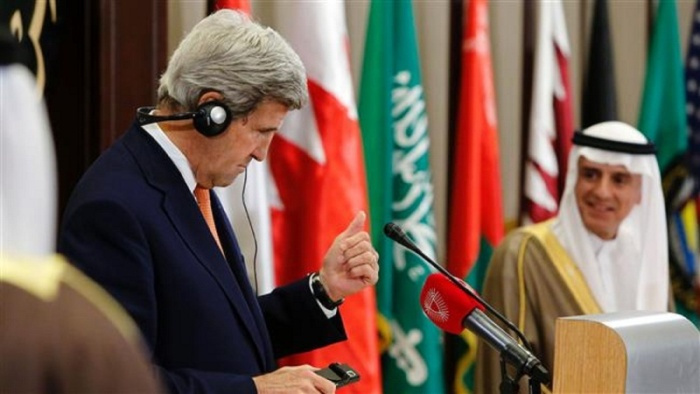What Washington’s Middle East Policy Lacks

By: Mohammad-Mahdi Mazaheri
Visits by the US secretary of states to the Middle East are nothing extraordinary, and usually do not send new signals. The top diplomat of a superpower pays regular visits to his regional allies to renew old ties. But in his recent trip, John Kerry went to great lengths to appease small dictators of the Middle East and obsequious failed leaders. That the visit was made to tranquilize regional states which, following the nuclear deal, have become worried about the prospect of Iran-US rapprochment and a potential rift between themselves and Washington is an open secret, but Washington’s renewed enthusiasm, after a period of disinterest, shown towards Arab states of the Middle East, and flexing muscles for Iran from the southern coast of the Persian Gulf sounds unfamiliar considering Washington's pattern of behavior during the recent years.
Throughout the recent years, the Democratic administration of the United States has come to the conclusion that applying its hegemony over the Middle East -with all the sectarian strife and strategic competitions it holds- would not be as easy as before, and to create a stable Middle East, there is no way but to acknowledge Iran’s unparalleled influence in the region. Following a decade of failure in establishing its favorable order in the region, the US has accepted that Iran’s power is based on natural, diverse advantages. One has to bury their head in the sand to ignore this reality and try to sideline the country from security arrangements in the region. However, John Kerry’s remarks in his recent trip to the region are a clear diversion from this pattern of diplomacy throughout recent years and interaction with Iran to improve the situation in the region.
Democrats have proved the precision of their observation and analysis of Middle East’s state of affairs. What they lack is courage. This is of course not the courage that candidates like Trump are speaking of: the fading image of a tired, yet ultimately victorious cowboy. In a world where Western films are not popular anymore, Obama and friends' need for a stable Middle East is the audacity to accept the reality and convince regional allies about it.
However, the current 'reactive diplomacy' of Washington endlessly aims to appease Middle Eastern friends whose main instrument in regional diplomacy is their petrodollars, some of which are earmarked for arms' purchase and some of which are spent to support extremist groups. The folly of Persian Gulf sheikhdoms who think that they can buy security with such methods borders on joke.
A glance at historical experience and current state of affairs in the Middle East shows that the mistrust and hostility of regional powers towards each other, compensated by reliance on extraregional powers, at best brings nothing but armed peace and constant fear from other parties. What the Middle East needs most at the moment is collaboration between “real” powers of the region in collaboration with extraregional powers to achieve ideal security arrangements which serve the 'nations' in the region. If Washington wants to play a constructive role in the Middle East and the Persian Gulf region, it should add courage to its diplomatic mix, stop the pursuit of dual behaviors, and realizing Iran’s peaceful, trustable, and negotiation-friendly attitude in the nuclear talks, stop fighting the reality only for the sake of appeasing Persian Gulf sheikhdoms. Resisting against Arab states' pressure and formulating a realistic diplomacy in the Middle East not only helps create peace and stability, but also neutralizes the Republicans' criticism against liberals and helps Democrats play a better hand in the upcoming presidential elections.
* This piece was originally published in IRD Persian. Mohammad-Mahdi Mazaheri is a university lecturer and Middle East affairs analyst.

